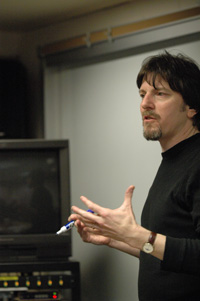"I create environments that are, I hope, exciting and surprising and challenge your accepted way of looking at something. I think that's a very important thing to do, especially teaching what I do, which is, frankly, how to be creative. And I think you can teach that. I had to learn to do that myself. And the techniques I use are exactly the same techniques that I teach."
"There are two parts to creating. One is exploring and the other is culling. If you confuse them, then you won't get anywhere. Mick Goodrick once said to me, 'When you swim, there is stroking and then there's gliding. And if you only stroke you won't be able to swim, because you won't get anywhere. You need to be able to glide in between strokes.' There's a period of time when you are capturing the things floating around through you, and you have to be very careful not to be judgmental at that point. There is also the point when you need to be critical and throw things out, but if you go there at the wrong point in the process you'll simply muck it up."
"Also, remember that you will produce bad music as well as good music. In fact, you can't produce one without the other, because bad music is what you make on the way to making good music. So you just can't worry about it. You need to worry about whether it's clear, whether it's saying what you want it to be saying, whether it's concise, and whether it's powerful. The word good isn't in there."
"Berklee is about real-world teaching. It's essential that I continue to have an active professional life to teach what I do. The tools of the trade are changing so much. A lot of it is technological, and some of it is otherwise. If you take a look at a movie now, you'll see a 90-minute movie with 85 minutes of music. If you look at a 90-minute movie from 20 years ago, they'll have 35 minutes of music. The grammar, the logic, of how movies are made has changed unbelievably in 20 years. My students are going to have a completely different world than I have. So they have to learn to learn. They have to learn how to think in forward-looking ways. All that is part of being creative, being open to new experiences and new styles and new tools."

